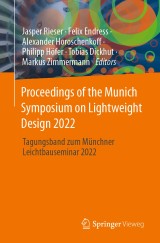Details

Proceedings of the Munich Symposium on Lightweight Design 2022
Tagungsband zum Münchner Leichtbauseminar 2022|
149,79 € |
|
| Verlag: | Springer Vieweg |
| Format: | |
| Veröffentl.: | 09.09.2023 |
| ISBN/EAN: | 9783031337581 |
| Sprache: | englisch |
Dieses eBook enthält ein Wasserzeichen.
Beschreibungen
Every year, the Technical University of Munich, the Universität der Bundeswehr München, and the University of Applied Sciences in Munich invite researchers and practitioners to join the Munich Symposium on Lightweight Design. Experts from industry and academia discuss design tools, applications, and new developments. Topics include, e.g., composite structures, SHM, microstructures, material modelling, design for additive manufacturing, numerical optimization and in particular topology optimization in aerospace, automotive and other industries. The talks are summarized in short articles and presented in this volume.
<div>tba</div> <p> </p>
<p><b>Jasper Rieser</b>’s<b> </b>research is about topology optimization methods with a particular focus on the design for additive manufacturing. Currently, he is a research associate at the Laboratory for Product Development and Lightweight Design at the Technical University of Munich (TUM) from which he also obtained his bachelor's and master’s degree in mechanical engineering.</p><p><b>Felix Endress </b>is a research associate at the Laboratory for Product Development and Lightweight Design at the Technical University of Munich (TUM). He investigates product development approaches for metal additive manufacturing, with a special focus on optimization and validation of aerospace structures. Previously, he conducted research in the field of Engineering Design at the University of Cambridge and Friedrich-Alexander-Universität Erlangen-Nürnberg. He holds master’s degrees in Mechanical Engineering and Engineering Management.<br></p><p><b>Alexander Horoschenkoff </b>studied mechanical engineering at TUM and received his PhD from the mechanical engineering department. He started his career at the research center of Messerschmitt-Bölkow-Blohm (MBB) in Ottobrunn. Within the research core team of the DaimlerChrysler AG he was responsible for the mechanical technology field. Since 2001 he has been a professor at the Munich University of Applied Sciences, Department of Mechanical Engineering, Automotive and Aeronautics Engineering and head of the CC “Smart Composites”.</p><p><b>Philipp Höfer </b>is a full professor at the Institute of Lightweight Engineering within the Department of Aerospace Engineering at the Universität der Bundeswehr München. After obtaining his PhD in the field of material modelling and continuum mechanics, he has gained extensive experience in the development of aircraft structures at Airbus over many years. His research interests include the conceptual, functional and structural design of lightweight structures and the investigation of their static and dynamic characteristics by analysis and test.</p><p><b>Tobias Dickhut </b>is a full professor of Composite Materials and Technical Mechanics at the Institute of Aeronautical Engineering within the Department of Mechanical Engineering at the Universität der Bundeswehr München. After obtaining his PhD in the field of lightweight construction and structures with fibre-reinforced plastics, he has gained extensive experience in the development of space structures at MT Aerospace over many years. His research interests include the scientific engineering research and design with composites, in particular the issues of lightweight (hybrid) force transmission into highly stressed structural components made of composite materials and the development of tank structures for cryogenic media.</p><p><b>Markus Zimmermann</b>‘s<b> </b>research is about the design and optimization of complex mechanical systems, such as automobiles or robots. Before he became a professor at TUM, he spent 12 years at BMW designing vehicles for crash and vehicle dynamics. His academic training is in Mechanical Engineering with degrees from the Technical University of Berlin (Diplom), the University of Michigan (M.S.E.) and MIT (Ph.D.).</p><div><br></div>
Every year, the Technical University of Munich, the Universität der Bundeswehr München, and the University of Applied Sciences in Munich invite researchers and practitioners to join the Munich Symposium on Lightweight Design. Experts from industry and academia discuss design tools, applications, and new developments. Topics include, e.g., composite structures, SHM, microstructures, material modelling, design for additive manufacturing, numerical optimization and in particular topology optimization in aerospace, automotive and other industries. The talks are summarized in short articles and presented in this volume.<div><br></div><div><br></div>
Covers a vast array of special topics dealing with optimization of metallic and composite structures Provides insights on current developments and advances in design for additive manufacturing Includes both research and application-oriented aspects of lightweight design
Diese Produkte könnten Sie auch interessieren:

Neutron Applications in Earth, Energy and Environmental Sciences

von: Liyuan Liang, Romano Rinaldi, Helmut Schober

149,79 €

Nanobioelectronics - for Electronics, Biology, and Medicine

von: Andreas Offenhäusser, Ross Rinaldi

96,29 €














